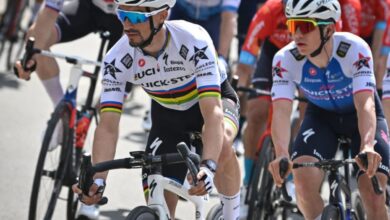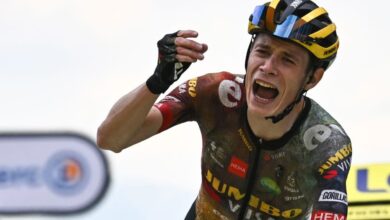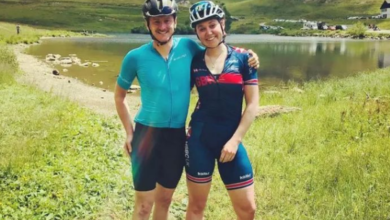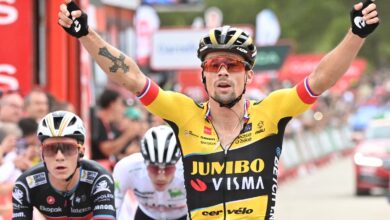‘It changes everything’: Why the Tour de France Femmes is a historic moment for women’s cycling
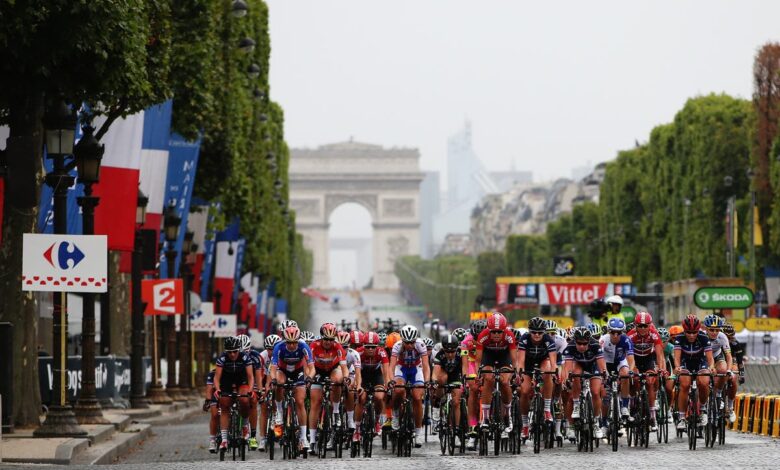
After years of failed attempts and half-hearted gimmicks, women’s cycling will finally have a Tour de France worthy of the name when it begins in Paris on Sunday. The brand new Tour de France Femmes is the most lucrative ever women’s cycling race, bursting with talent on a varied and challenging eight-stage parcours built to entertain, and organiser ASO has perhaps finally planted the seeds of a race which will grow and blossom for many summers to come.
There have been several different incarnations of a women’s Tour de France stretching back to 1955. The race peaked during the 1980s but faded away, and when it returned under the guise of the one-day La Course in 2014, thanks to sustained pressure and campaigning, it always felt like a token gesture, an afterthought tacked on to the men’s race. ASO’s claim that it was unfeasible to have both a men’s and women’s Tour only ever seemed like an excuse.
Now the Tour de France Femmes stands alone as a multiple stage race in its own right, with the resources and the momentum to flourish. Virtual cycling giant Zwift is the lead sponsor, signing a four-year deal and helping fund a prize pot of more than £200,000, with around £40,000 for the winner. More significant is that TV coverage of the race will be wide-reaching, even if it is a shame ITV will not be showing the action free-to-air as it has done for the men’s edition. UK fans can watch via Eurosport, Discovery+ or Global Cycling Network.
“This is the most important thing, actually getting it out there for people to see and be more aware of it,” says Britain’s Lizzie Holden, who will ride for Team Le Col–Wahoo (Le Col is handing out thousands of free TV passes so more fans can watch). “I think if you asked everyone in the peloton what’s more important, the prize money or the TV coverage, I think most would say TV coverage.”
Holden didn’t think she would have any chance of being part of this when it was first announced, but a change of teams, coupled with her performances over recent months, saw her rise into contention. “A few weeks ago Nico [Marche], the team director, called and he was like: ‘So we’ve finally made the decision, you’ll go to the Tour.’ It was weird because I was just on my own at home, but obviously I was over the moon.”
Her team will target stage wins and the chance to grab hold of the Queen of the Mountains’ polka dot jersey on the opening day, while Holden has her own eyes on stage four, a Strade Bianche-style classics race containing plenty of gravel-track road. “I think it will be epic,” she says. Holden rode La Course too, but this is different. “To finally have eight days is really special.”
The sport will speak for itself. It is a line-up stacked with talent, featuring Dutch legends Marianne Vos (for Jumbo-Visma, a team aiming to win both the men’s and women’s Tours this year) and Annemiek van Vleuten (for Movistar, and currently UCI’s No 1-ranked rider); Italy’s ever-consistent Elisa Longo Borghini (Trek-Segafredo); then there’s Team SD Worx with former Olympic champion Anna van der Breggen in the team car as director, and differing threats on the road in the shape of South African climber Ashleigh Moolman-Pasio and the Netherlands’ rising star Demi Vollering.
Organisers might unashamedly hope for Cecilie Uttrup Ludwig to claim victory, the 26-year-old Dane whose engaging interviews occasionally go viral and whose huge grin and even bigger personality carry untold marketing potential.
It may not be a full 21-stage race but the eight days are packed with variety, beginning at the Eiffel Tower and working east into the hills of the Vosges mountains, before finishing with two gruelling stages which culminate on the Planche des Belles Filles. La Planche has become a modern classic in the men’s race and it is these little touches – the one-day overlap with the men’s Tour, the stage-one finish on the Champs-Elysees, and the identical jerseys and classifications – which give just the right amount of continuity and affiliation with the Tour de France while standing alone as a race in its own right.
There is hope that the impact of the Tour de France Femmes will run deep into the foundations of the sport. Louise Vardeman has been a leading voice for the cause, founding cycling team InternationElles who rode the full route of the 2019 Tour de France to campaign for a women’s race, and she believes this can be a turning point in the history of the sport. “It changes everything,” she says. “I love the fact that in a couple of weeks’ time a little girl can turn on the telly and see women in the Tour de France, and she knows that she can maybe go on to be a professional cyclist as a career.”
Vardeman rode the 2019 route only three years after taking up the sport as a hobby. Her team cycled a day ahead of the men’s race and actually completed more kilometres, because one stage of the official Tour had to be truncated due to a mudslide. They received worldwide media coverage and used their platform to ask why women didn’t have their own Tour de France. Her message got through to the professional scene, with a number of women’s riders reaching out, including Uttrup Ludwig. “She’s wonderful,” says Vardeman. “She’s so enthusiastic about everything and she has always been supportive of what we’ve been doing and loves the fact that there’s now a women’s Tour de France.”
On a rest day during the 2019 Tour, Team Sky riders including reigning champion Geraint Thomas caught up with Vardeman’s group and were blown away by what she and her teammates were doing with such little equipment and support in comparison to the professional peloton. “They didn’t see any reasons why there shouldn’t be a women’s Tour de France,” she remembers. “They were in complete agreement with us that there should be one.”
Vardeman noticed more women getting into the sport during its lockdown boom, causing a shift from the male-dominated environment she entered seven years ago, and believes the Tour de France Femmes can only fuel progress. “From grassroots and amateur all the way up to pros, now when they say ‘I’m a cyclist’ and someone goes, ‘Oh, do you do the Tour de France?’, they can actually say, ‘Yeah, I do’ or ‘I’m aspiring to ride the Tour de France.’ It changes everything. There’s finally something of equal prestige for the women to aim for as an opportunity within cycling as for the men.”
There is still a long road to equality in cycling, a sport which is far from finished rooting out sexism and misogyny. Financial disparities remain enormous and media coverage is incomparable, but moments like Sunday are small but significant steps.
“I think we’re just getting started, I suppose La Course was kind of stage one,” says Vardeman. “This is maybe stage two or three but at least we’re on the journey and that’s the main thing, it is positive change. People are asking for more coverage and more women’s races and more prize pots, so change is happening. We’re absolutely miles from equality, but we’re going in the right direction now.”
InternationElles celebrate on the Champs-Elysees in Paris
The inaugural Tour de France Femmes is live and exclusive on Warner Bros. Discovery. Available across discovery+, Eurosport, GCN+
Marianne Vos is one of the contenders for glory

